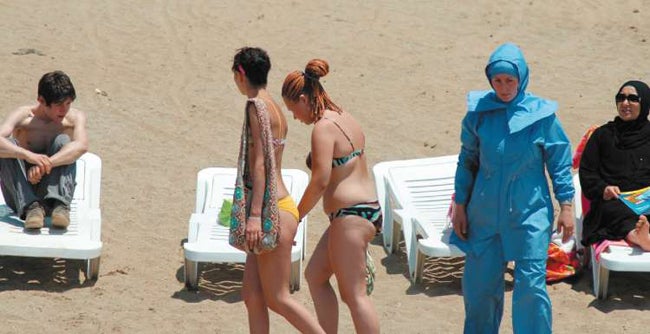Boom in bikini-free holidays as Turkish women cover up

Your support helps us to tell the story
From reproductive rights to climate change to Big Tech, The Independent is on the ground when the story is developing. Whether it's investigating the financials of Elon Musk's pro-Trump PAC or producing our latest documentary, 'The A Word', which shines a light on the American women fighting for reproductive rights, we know how important it is to parse out the facts from the messaging.
At such a critical moment in US history, we need reporters on the ground. Your donation allows us to keep sending journalists to speak to both sides of the story.
The Independent is trusted by Americans across the entire political spectrum. And unlike many other quality news outlets, we choose not to lock Americans out of our reporting and analysis with paywalls. We believe quality journalism should be available to everyone, paid for by those who can afford it.
Your support makes all the difference.When Serafettin Ulukent opened his holiday village in a cove on Turkey's Aegean coast in the 1980s, his first guests were German surfers, who enjoyed the brisk winds, cool beers and chilled-out beach parties. But since he stepped in one day to help 100 conservative Turkish Muslims abandoned by a tour operator, there has been no turning back.
"The surfers were fun, but these people had real money," he said. Mr Ulukent's hotel became one of the first in Turkey to cater exclusively for devout Muslims – no alcohol, segregated bathing, and a pastry cook who earns an extra £60 a month to sing the call to prayer five times a day.
A decade on, Islamic tourism is the fastest-growing part of Turkey's £10bn industry. A new Islamic hotel recently opened in Bodrum, a resort popular with British tourists where topless bathing is common.
The religious-minded AK Party is in power, but the state enshrines secularism so debates about Islam crystallise around headscarves and women's covering. At the weekend, a group of 50 women in skimpy dresses marched in Istanbul in protest at what they see as the creeping Islamisation of Turkish society after a woman was convicted of exhibitionism for wearing "improper clothing".
Many Turks single out the hotels as evidence of the impact of religious conservatism. Mr Ulukent, a non-practising Muslim, has had his share of fanatics. One guest was angered by music coming from the women's bathing area. "He said it was a sin," explained Mr Ulukent. "We told him to calm down – this is a hotel, not a morgue."
But he thinks it is the patriarchal attitudes of macho Turkish men rather than Islamisation, which is pushing the demand for his kind of hotel. Religious women claim it is they who are punished for their views.
standing with her husband in a travel agency near Istanbul's Taksim Square, Fatma Sarioglu says she was the one demanding a summer holiday in an Islamic hotel, not her husband. "He and the kids can swim anywhere they like," she said. "If these sorts of places didn't exist, I'd have to content myself with the women's hour at the municipal pool."
In the past, there were women-only beaches. They were closed in 1997on the ground that the coast is a "public space", during a crackdown on political Islam that followed a military intervention against an Islamic government. Feminine modesty, Islamic or otherwise, now "constitutes an 'anti-secular' act in our country", said Nihal Bengisu Karaca, a well-known columnist. Ms Bengisu knows about the difficulties of balancing the two. She took her husband and son down cliffs in search of secluded inlets that nobody else could get to. She has even braved the beach in a hasema, a swimsuit designed to hide women's curves while they swim. It looked "like a Ku Klux Klan cloak", she said.
But she is no fan of Islamic hotels. None has a women's beach, and the women's pools are invariably smaller than the men's. They are also too expensive, claimed Ms Bengisu.
When she published an account of her bathing experiences last summer, the headscarf-wearing wife of Turkey's President was among hundreds of women to congratulate her. Conservative men reacted less well. Ms Bengisu puts their criticisms down to the patriarchal attitude many Turkish men have. "The attitude was 'When so much money is being spent to keep the wife happy, the very least she can do is not complain'," she said.
She has now all but abandoned her dreams of balancing pleasure and piety. A covered woman on holiday, she believes, is like "an out-of-tune singer in the middle of a concert".
Subscribe to Independent Premium to bookmark this article
Want to bookmark your favourite articles and stories to read or reference later? Start your Independent Premium subscription today.
Join our commenting forum
Join thought-provoking conversations, follow other Independent readers and see their replies
Comments